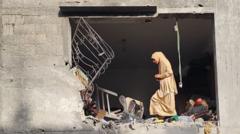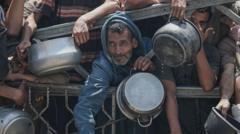Israel's military campaign in Gaza has escalated dramatically, resulting in significant casualties and a worsening humanitarian crisis, as defense officials announce plans to expand their operations across the Palestinian territory.
Escalating Violence in Gaza: Israel Expands Military Operations Amid Humanitarian Crisis

Escalating Violence in Gaza: Israel Expands Military Operations Amid Humanitarian Crisis
Reports of widespread casualties as Israel intensifies military strikes in Gaza, targeting what it calls 'terrorist infrastructure.'
In the latest developments, Israeli air strikes have reportedly claimed the lives of at least 12 individuals in Khan Younis and 19 more in a strike on a UN clinic in Jabalia, where many displaced families had sought refuge. The Israeli defense minister, Israel Katz, stated that the military's goal is to create "security zones" by seizing large areas of Gaza, a move that he claims is essential to "destroy and clear the area of terrorists and terrorist infrastructure." This escalation follows a new offensive that began on March 18, after Hamas allegedly rejected US proposals aimed at extending a ceasefire while ensuring the release of hostages held by the group.
Local hospitals reported that the overnight strikes had killed over 20 people, with the Israeli military asserting that its operations were focused on eliminating Hamas operatives. Eyewitness accounts from survivors depict a harrowing scene, with one woman recounting the devastating impact of a strike that killed her neighbor and her infant child. As casualties mount, the situation in Gaza is dire, with reports indicating that more than 50,000 have died since the onset of hostilities.
The UN agency for Palestinian refugees confirmed that one of its clinics had been hit, though details on casualties remain unclear. Amidst this chaos, the Israeli military confirmed its intention to advance its ground forces into central Gaza, leaving thousands of civilians in Rafah under evacuation orders. The humanitarian situation continues to deteriorate as aid access has been severely restricted since early March. In light of these developments, local and international calls for a de-escalation grow louder.
The humanitarian implications of this conflict continue to evolve, with the international community increasingly concerned about the toll on civilian life as the fighting escalates.
Local hospitals reported that the overnight strikes had killed over 20 people, with the Israeli military asserting that its operations were focused on eliminating Hamas operatives. Eyewitness accounts from survivors depict a harrowing scene, with one woman recounting the devastating impact of a strike that killed her neighbor and her infant child. As casualties mount, the situation in Gaza is dire, with reports indicating that more than 50,000 have died since the onset of hostilities.
The UN agency for Palestinian refugees confirmed that one of its clinics had been hit, though details on casualties remain unclear. Amidst this chaos, the Israeli military confirmed its intention to advance its ground forces into central Gaza, leaving thousands of civilians in Rafah under evacuation orders. The humanitarian situation continues to deteriorate as aid access has been severely restricted since early March. In light of these developments, local and international calls for a de-escalation grow louder.
The humanitarian implications of this conflict continue to evolve, with the international community increasingly concerned about the toll on civilian life as the fighting escalates.



















